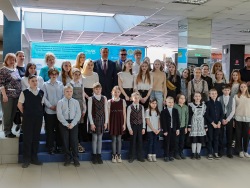Coastal crabs prefer pasta: Young explorers give outstanding presentations at an international youth conference

Members of the Growing up at the Aquarium project took part in the International Youth Ecological Conference “Man and Biosphere” held in April, 2022 in Vladivostok. The students had already won several awards at scientific conferences for children before, but that time it was an outstanding case, because all the participants were honored. One first prize, two second, one third and two special prizes were added to the set of achievements of the Growing up at the Aquarium project.
The International Youth Ecological Conference “Man and Biosphere” has been organized for 19 years by the Federal Scientific Center of the East Asia Terrestrial Biodiversity, FEB RAS (the FSC EATB FEB RAS) and the Citizen Science Coordination Center “Water of Life” owing to enthusiastic efforts of Tatyana S. Vshivkova, PhD (Biol.), Senior Researcher of the Laboratory of Freshwater Hydrobiology, FSC EATB FEB RAS. The conference brings together attendees from primary schoolchildren to university students and post-graduates, thus creating marvelous opportunity for junior ecologists to learn from their older peers, to understand environmental issues better and to participate in actual scientific discussions. This year young discoverers have been welcomed by speeches from recognized ecologists, including Nadezhda K. Khristoforova, Dr. of Biology, Professor of the Far Eastern Federal University.
The Primorsky Aquarium was represented by students of pre-school to high-school age who delivered six reports. The children discussed a range of problems, from conservation of the manchurian pipevine, a species categorized as Endangered in the Russian Federation Red List (Vladimir Dormidontov, 1st place, Secondary School category, “Propagation of the Endangered Manchurian Pipevine Aristolochia manshuriensis Kom., 1904 by Seed and Cutting in Order to Restore its Population in Primorsky Krai”), to protection of pinnipeds, from methods of aquatic animal husbandry to regeneration studies. The jury highly appreciated careful selection of research methods and good academic language of the projects carried out by our students. Alexander Molostvovov (3rd place, High School category, “Problems of Pinniped Research and Protection and How They are Tackled at the Primorsky Aquarium”) grasped the audience’s attention by his presentation about the pinnipeds of the Primorsky Aquarium. Participants were eager to know why tusks are removed in captive walruses and how smart spotted larghas are. Daniil Kozulya (2nd place, Secondary School category, “Creating an Artificial Pond for Snakeheads (Channa argus: Channidae)”), student of the fifth grade, carried out research on the optimal conditions for a garden pond for snakeheads and even calculated the budget of the project. Aleksandra Batalova (2nd place, High School category, “Regeneration in Planarians Affected by Surface Active Agents (SAAs)”) attracted listeners’ attention to regeneration processes in planarians as people had always been eager to know how to restore lost body parts as easily as these flatworms. Marina Samoilenko’s presentation (special “Young Discoverer” prize, “Studies into the Species Diversity of Decapoda in the Areas of Minonosok Bight, FEFU Embankment and Popova Island”) aroused plenty of positive emotions in the attendees. She had studied the species diversity of Decapoda distributed along the Sea of Japan coast. Her study displayed that coastal crabs were real foodies as they preferred boiled pasta to beefsteaks, stewed vegetables, bread and other kinds of human food.
Presentations of students from the Primorsky Aquarium and other organizations convincingly demonstrated that the future of the biosphere would be in good hands of the next generation, caring, curious, well-educated and skillful young people.